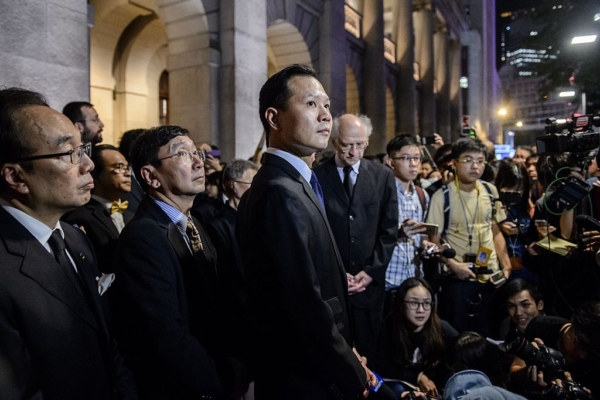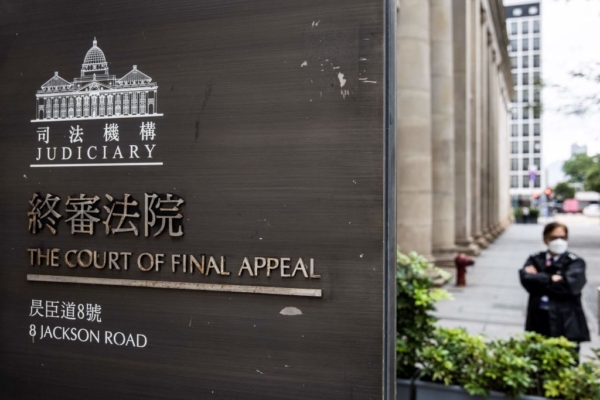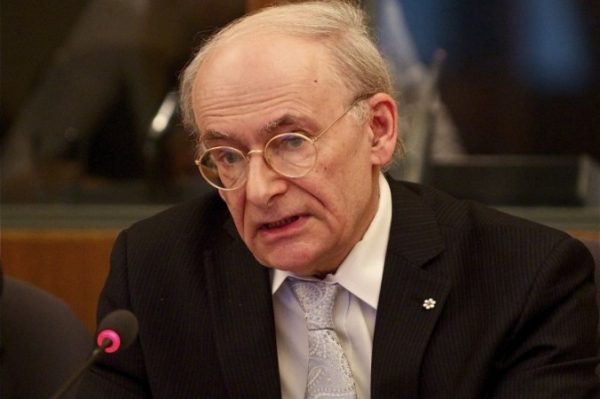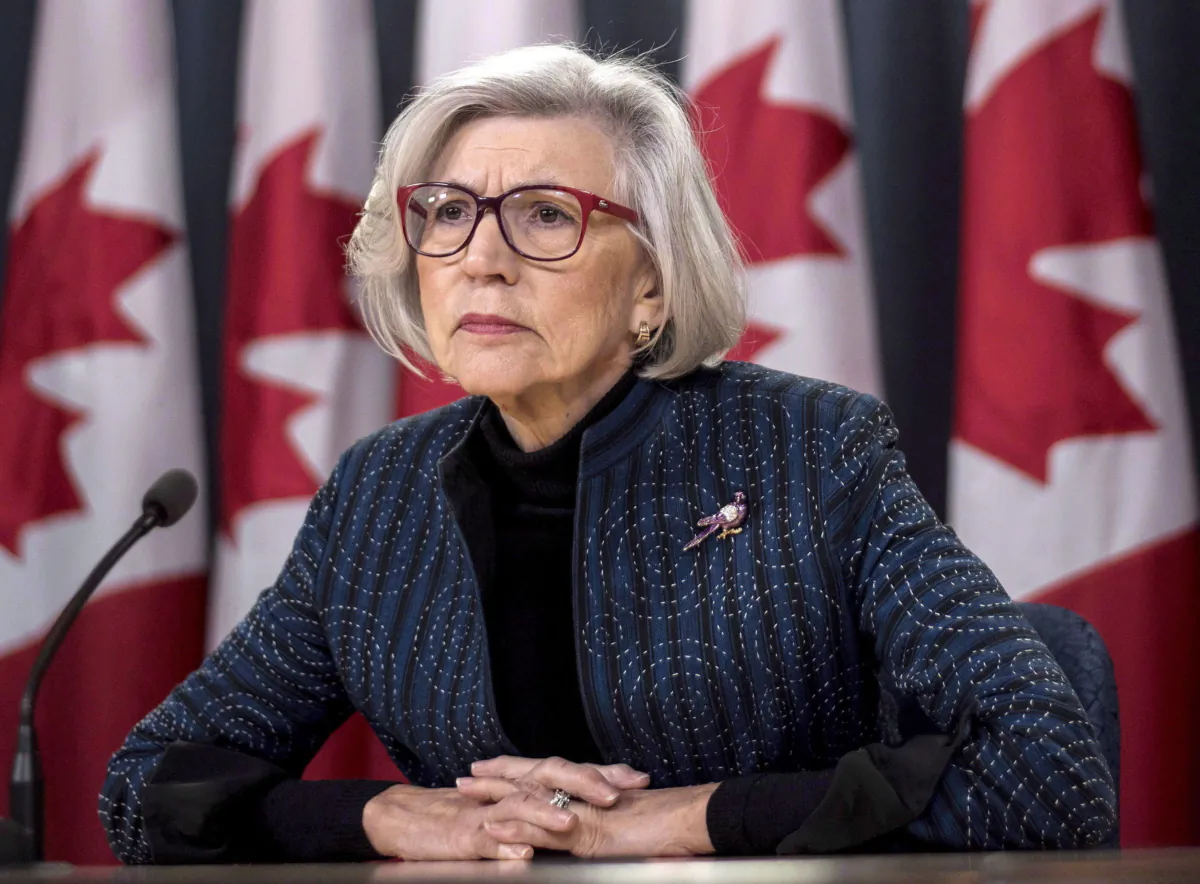Renewed Calls for Canada’s Ex-Chief Justice to Quit Hong Kong’s Top Court as HK Police Hunt Democracy Activists
Calls for Canada’s former chief justice Beverley McLachlin to resign from Hong Kong’s top court have rekindled after police in the city offered bounties for eight self-exiled pro-democracy activists living overseas.
“Given the nature of the Chinese Communist Party [CCP] and its control of Hong Kong, the courts in Hong Kong will not remain independent from the Party, insofar as they are today independent,” said Winnipeg-based international human rights lawyer David Matas.
“Former chief justice McLachlin is part of an institution which is degrading, moving from the rule of law to the rule of the Party.”
The Epoch Times reached out to Ms. McLachlin for comment but didn’t hear back.
Ms. McLachlin, who served as chief justice of Canada between 2000 and 2017, was first appointed as a non-permanent judge in the Hong Kong Court of Final Appeal (CFA) in 2018, and was re-appointed in 2021.
The calls for Ms. McLachlin’s resignation came after the National Security Department (NSD) of the Hong Kong Police Force issued arrest warrants for eight pro-democracy activists on July 3. For each wanted individual, the police is offering an HK$1 million (C$170,000) reward for information on the person and the related crimes. The activists fled the region after city authorities implemented the Hong Kong National Security Law (NSL) in 2020.
The NSL was introduced in response to a large-scale pro-democracy movement in 2019. Residents protested Beijing’s growing encroachment on Hong Kong’s autonomy, which the former British colony continued to enjoy after its return to Chinese rule in 1997.
The eight activists currently reside in the United States, the United Kingdom, and Australia. Among them is Dennis Kwok, or Kwok Wing-hang, a former Hong Kong politician who was born in Canada. Others include Kevin Yam, Yuan Gong-yi, Kwok Fung-yee, Hui Chi-fung, Mung Siu-tat, Lau Cho-dik, and Law Kwun-chung.

They are accused of offences under the NSL, including “incitement to secession,” “subversion,” “incitement to subversion,” and “collusion with a foreign country or with external elements to endanger national security,” according to the NSD press release.
Mayor Brad West of Port Coquitlam, B.C., referred to the NSD arrest warrant for Mr. Mung in a July 4 Twitter post.
“This is what former Canadian Chief Justice Beverley McLachlin is enforcing on behalf of the Chinese Communist Party,” he wrote. Mr. Mung was the executive director of Hong Kong-based labour rights organization the HK Labour Rights Monitor.
Mr. West has been outspoken against the CCP’s suppression of democracy in Hong Kong and the regime’s other human rights abuses. In 2019, he called out the Union of BC Municipalities for receiving funding from the Chinese Consulate as sponsorship for its annual convention.
Non-Permanent Judges
In accordance with its common law tradition, Hong Kong appoints foreign judges to its courts, independent of the mainland’s Party-led socialist legal system. Currently, there are 11 overseas non-permanent judges in Hong Kong’s CFA.
McLachlin began a three-year term as a non-permanent judge in 2018, and was re-appointed for a second three-year term in 2021.
At least four overseas non-permanent judges have resigned from their roles in the Hong Kong CFA, citing concerns over the passing of the NSL. The first was Australia’s James Spigelman, who resigned in 2020 and who previously served as chief justice of the Supreme Court of New South Wales from 1998 to 2011. UK judge Brenda Hale stepped down from the role in 2021 after her three-year term ended, followed by UK judges Robert Reed and Patrick Hodge.
In a statement released on July 17, 2020, Mr. Reed noted that the national security law “contains a number of provisions which give rise to concerns.” He also warned that whether judges of the UK Supreme Court can continue to serve as judges in Hong Kong “will depend on “whether such service remains compatible with judicial independence and the rule of law.”

In light of the recent events, Andy Wong, policy researcher for the Ontario-based NGO Canada-Hong Kong Link, bemoaned that the rule of law is no more in Hong Kong.
“These non-permanent judges from Western democracies should resign from the CFA of Hong Kong. What more evidence do they need to say that HK no longer has the rule of law but has the rule by law? Isn’t it obvious that the law in Hong Kong does not protect human rights and freedoms?” he told The Epoch Times.
A number of legal experts have previously called for Ms. McLachlin’s resignation. Among them is Ryan Alford, professor at Lakehead University’s Bora Laskin Faculty of Law, who said her continued service in the CFA is “really disconcerting.” He voted in favour of a motion to call for Ms. McLachlin’s exit from the Hong Kong court at the February 2021 Convocation of the Law Society of Ontario, the province’s legal regulator.
Exercising Control
During an interview with the YouTube channel The Yunusov Question in April, Ms. McLachlin spoke about public concerns about the fact that she continues to serve as a judge in Hong Kong while people’s rights are being diminished. Her response was that the Hong Kong court is “independent” and that she holds on to the position because it was “the principled thing to do.”
“I don’t think the fact that people are suffering under diminution of rights, it doesn’t logically follow that you get rid of the court—the courts are there to protect the rights. As long as that court is independent—and that is an absolute requirement for me—I see no reason to resign,” she said.
However, Mr. Matas said there are many ways for Beijing to exercise control over the rule of law in Hong Kong, even if something as obvious as the Communist Party giving directives to judges to make certain judgments has not yet occurred.
Pointing to the judicial system in mainland China, Mr. Matas said the CCP exercises control in courts through judicial or adjudication committees, which are committees of judges who decide cases outside of the courtroom and which tell the judges who hear the cases what their decisions will be. He said Party officials participate in these judicial committee meetings and in effect control them.
“To my knowledge, there are no such judicial or adjudication committees in Hong Kong, though I would not be surprised if they were at some point instituted,” he said.

Mr. Matas also pointed to a list of ways in which the independence of courts in Hong Kong can be impacted, such as through the selection of panels of judges to hear contentious cases, the appointment of judges, and the promotion and demotion of judges. Additional ways include preventing certain cases from being brought to court or appealed, having a selective prosecution in bringing cases to court, using the courts’ registries to frustrate the pursuit of particular cases, and denying the accused the right to counsel or access to counsel.
Mr. Matas also pointed to the newly installed section 27 in Hong Kong’s Legal Practitioners Ordinance. The new regulation gives the Beijing-controlled chief executive of Hong Kong power to deny permission to any lawyer to represent a client in national security cases.
“This change in the law is an attack on the independence of the judiciary, because it prevents being brought before the Court arguments directed against decisions made by the Party or the mechanisms it controls,” he said.
‘Shed a Light’
Mr. Matas said that while Ms. McLachlin and other foreign judges are not in any position to reverse the CCP’s takeover of Hong Kong, they can help cast light on the regime’s attacks on the rule of law by collecting evidence while still in their positions and acting as whistleblowers.
“I would indeed call on the former chief justice and her foreign justice colleagues on the Court to take advantage of their position to report on, to shed a light on the techniques the Party is introducing to impose its will on the Hong Kong courts, and then, concomitant with the release of their report, collectively resign,” he said.
“That collective reporting and resignation would likely have a greater impact than individual sequential resignations would do.”

No comments:
Post a Comment
Comments always welcome!